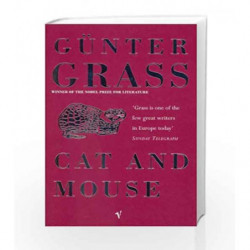

He stole that captain's iron cross, even though he was later on caught and rusticated from the school for this offence. Joachim Mahlke had been mischievous since his childhood. It was the time while the winds of World War II just started to blow across Europe. One day a German submarine captain visited his school and delivered a speech on the glory of war. He and his friends used to dive into the sea to look for treasures in the relics of sunken ships. In Cat and Mouse, Joachim Mahlke, a teenage German boy grows up with the freakish desire of becoming a clown. In Cat and Mouse, the mouse allegorically refers to the dreary state of ordinary men and women in society while the cat symbolizes the vicious role of a predator taking advantage of the unprotected plight of naïve and vulnerable people. He was awarded Nobel Prize for literature in 1999.

The ambience of World War II is strongly felt while reading most of his books. Another notable point about Gunter Grass is most of his fictional works are discourse novels due to frequent shifts in point of view while telling the story.

The bizarre physical and mental features of his protagonists in The Tin Drum and in Cat and Mouse reminded me of some of the people Victor Hugo portrayed in his novels Hunchback of Notre Dame and The Man Who Laughs taking into account the inevitable pathos that underpin the frisky narrative mode of the author. I bought a copy of Cat and Mouse by Gunter Grass (1927-2015) around four years ago from Aziz Super Market, Dhaka and while going through the moving novel Gunter Grass seemed to me very close to Victor Hugo in terms of characterization.


 0 kommentar(er)
0 kommentar(er)
